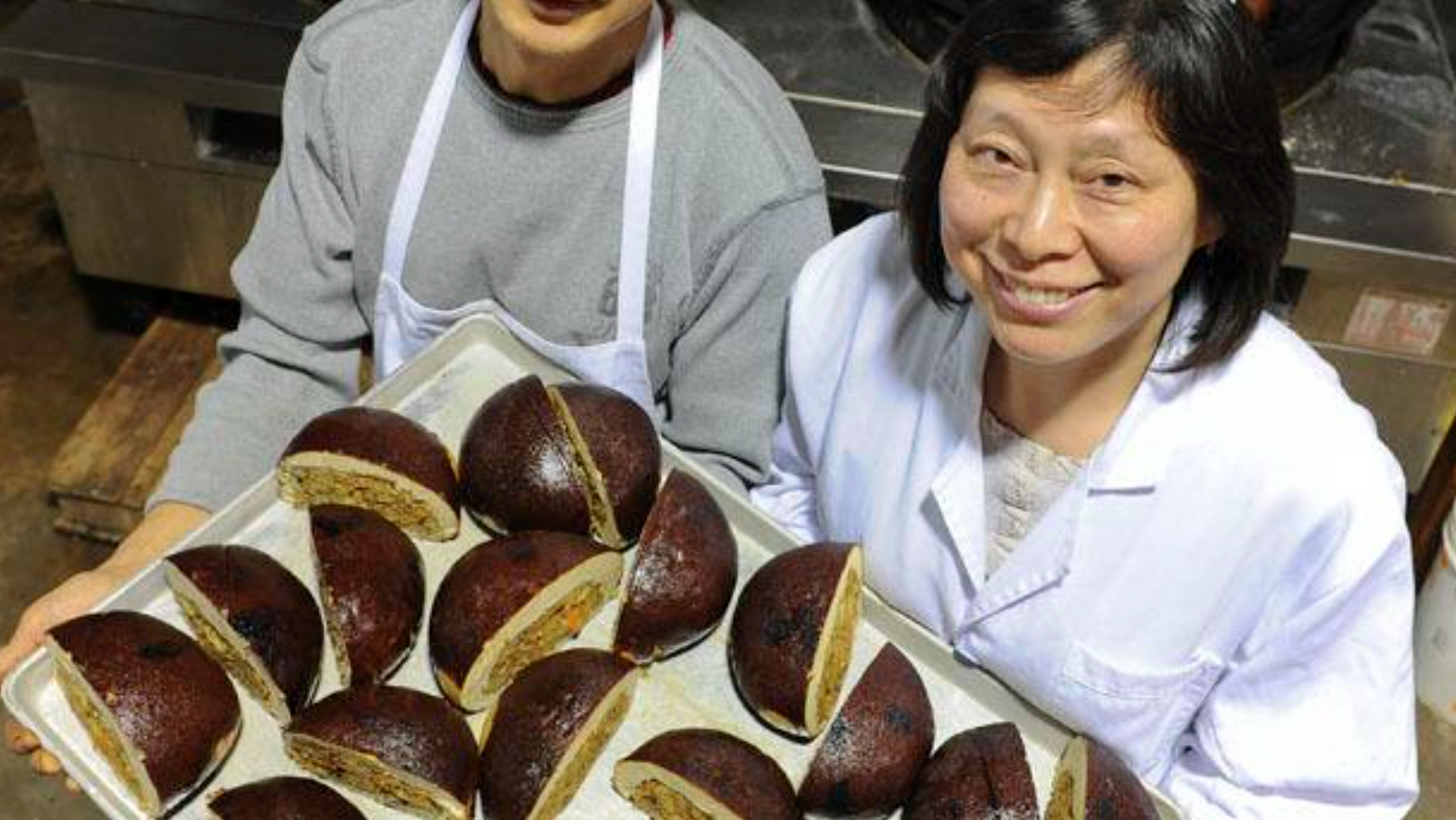Roast Tofu Instead of Turkey
Toronto Star
December 10, 2009

Ming Yu, left, and Christy Zhang “roast” tofu for the holidays.
In a spartan, cement and brick industrial space in Oakville, organic Ontario soybeans are being handcrafted into magical tofu products.
Dried beans are soaked overnight, ground with fresh water, strained and turned into soy milk. The soy milk, in turn, is cooked with a coagulating agent called magnesium chloride (a type of salt from Israel’s Dead Seas that Asians call nigari) that’s dissolved in water. The curdled result is tender, sweet tofu.
Christy Zhang and Ming Yu, partners in life and in Ying Ying Soy Food, take this blank slate of tofu and get creative.
They press it into standard “bricks” – firm or soft. They shape it into balls, loaves and burgers. They cut it into strips and toss it with six homemade sauces (like curry, miso, and sweet & sour). They smoke compressed tofu sheets into bacon. And they make a spectacular tofu roast (also known as tofu turkey).
In the spirit of this holiday season, and on behalf of curious vegetarians and adventurous eaters everywhere, I’ve come to Oakville to watch the tofu “roast.”
Zhang lays a single tofu sheet on a cloth square and presses down crumbled tofu mixed with sea salt. She adds a frozen, two-cup ball of traditional Canadian stuffing, pats more tofu over it, gathers up the cotton, wraps the one-kilo package into a ball and ties it with string.
These balls are boiled 30 minutes in a huge, cast-iron wok. They’re unwrapped and smoked over sugar in another wok for eight minutes.
The balls, as dark as pumpernickel loaves, are brushed with soybean oil for a glossy sheen. They’re usually sold halved (serving two to three people) and vacuum packed. Three hundred will be made this Christmas. The Zhang/Yu family will share one, plus dumplings, with their two kids on Dec. 25.
The roast slices just like turkey. The tofu hints at sweetness. The stuffing (carrots, onions, celery, mushrooms, herbs and whole wheat bread) is comfortingly Canadian. A former employee’s mom shared her family recipe.
We eat slices on paper plates around a stainless steel work table. The browned exterior looks and tastes like tofu “skin.”
“I love the stuffing – every time Christy makes it, I will steal some,” admits Yu.
It is that good.
“It’s too bad we don’t have any cranberry sauce,” he frets.
It doesn’t matter.
This lovingly made dish has ties to Canada (the stuffing) and China (the tofu). You don’t have to be vegetarian to enjoy it. Yu and Zhang aren’t. They grew up with tofu in Harbin, China.
Yu remembers when food was rationed in the 1960s. Each person got 1/4 kilogram ( 1/2 pound) of meat coupons per month, but enough tofu coupons to eat it every day. Yu also lived with his grandparents in the country for two years and helped with soybean harvests.
When the couple moved to Canada in 1990-1991, they missed Chinese tofu. They realized handmade tofu uses nigari as a coagulating agent, while machine-made tofu usually relies on calcium sulphate or calcium chloride. This creates taste and texture differences.
Zhang, 51, a former university English teacher, started Ying Ying Soy Food in 2001. Yu joined in 2003, leaving a banking career.
They struggled at first, aiming at Chinese groceries. Things took off after they got a booth at Toronto’s Vegetarian Food Fair and people urged them to target health food stores. Ying Ying Soy Food now has a shop at St. Lawrence Market, does two farmers’ markets and is in dozens of Greater Toronto stores.
Also at the urging of customers, the company switched to organic and non-genetically modified soybeans. Yu drives to Parkhill every six weeks to pick up dried and cleaned beans from Beechwood Agri Services, which gets them from Organic Meadow Co-operative and Great Lakes Organic.
A 30-kilogram bag of beans cost $12 three years ago. Now it is $31.
“I told Christy this business won’t make us rich, but it will change our lives in ways that money can’t buy,” says Yu.
They eat less meat now, and only naturally raised options. They, obviously, eat a lot more tofu.
The short shelf life of their tofu products, just five weeks, prevents wider distribution, but that’s probably just as well.
“We’re not very productive,” admits Yu. “As you can see, everything is done by hand.”
It’s not a criticism, and the artisan tofu maker knows it.
